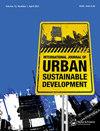Towards climate action and UN sustainable development goals in BRICS economies: do export diversification, fiscal decentralisation and environmental innovation matter?
IF 2.4
Q3 ENVIRONMENTAL STUDIES
International Journal of Urban Sustainable Development
Pub Date : 2023-06-13
DOI:10.1080/19463138.2023.2222264
引用次数: 4
Abstract
ABSTRACT Several nations across the world place a high focus on achieving carbon reduction objectives. Climate change is the most catastrophic result of human activity. Eco-innovation, export diversification, and fiscal decentralization are all viable approaches for resolving environmental concerns and achieving environmental sustainability goals. These tactics could help countries and levels of government pursue what they consider to be sustainable development. This research assesses the combined impact of export diversification, green technical innovation, and fiscal decentralization in order to accomplish the environmental sustainability goals of the BRICS countries from 1970 to 2020. The long-run dynamic equilibrium between the chosen variables is explored using the augmented mean group (AMG) approach. The results show that while the use of green technology and renewable energy improves the environment, ecological harm is aggravated by export diversification, fiscal decentralization, and economic growth. The BRICS nations should exercise caution while implementing export diversification and fiscal decentralization programs.金砖国家实现气候行动和联合国可持续发展目标:出口多样化、财政分权和环境创新重要吗?
本文章由计算机程序翻译,如有差异,请以英文原文为准。
求助全文
约1分钟内获得全文
求助全文
来源期刊

International Journal of Urban Sustainable Development
ENVIRONMENTAL STUDIES-
CiteScore
4.00
自引率
4.00%
发文量
24
期刊介绍:
International Journal of Urban Sustainable Development aims to provide a forum for cutting-edge research and rigorous debate for an in-depth and holistic understanding of the complex inter-related environmental, social, economic, political, spatial, institutional and physical challenges facing urban areas. Its premise is that multi-disciplinary approaches provide the space for the range of disciplines and perspectives related to the full breadth of issues that affect urban sustainable development.
 求助内容:
求助内容: 应助结果提醒方式:
应助结果提醒方式:


